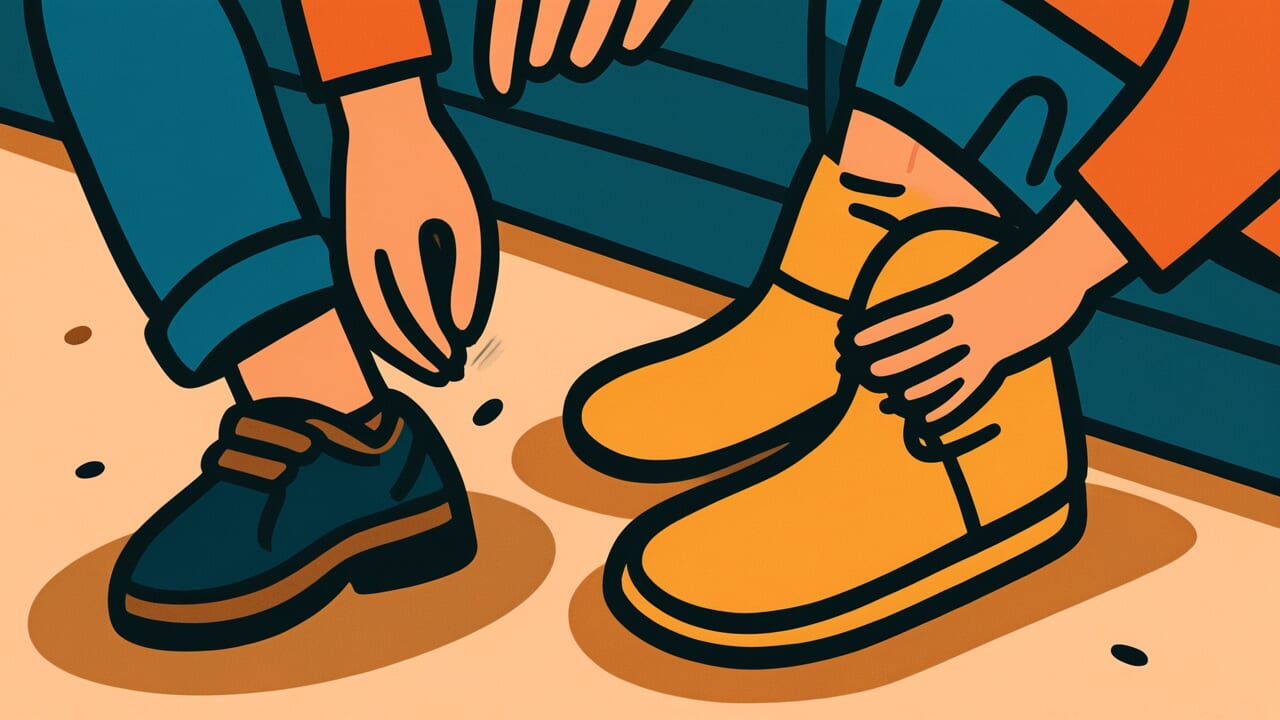How to Read “Making shoes without knowing the feet”
Ashi wo shirazushite kutsu wo tsukuru
Meaning of “Making shoes without knowing the feet”
This proverb warns against making plans or methods without properly understanding the actual situation. If you’re going to make shoes, you first need to know the exact size and shape of the feet. Without that knowledge, you’ll only end up with shoes that don’t fit.
This applies to all areas of life: work, study, and relationships. If you try to find solutions without accurately understanding the current situation, or make proposals without knowing the other person well, you’ll get results that miss the mark.
In today’s world, we’re flooded with information. It’s easy to focus only on methods and techniques. But this proverb reminds us of a fundamental principle: first, know the reality.
No matter how excellent a method is, it’s meaningless if it doesn’t match the actual situation. The proverb teaches the importance of looking carefully at reality before making plans.
Origin and Etymology
There are no clear records about the exact origin of this proverb. However, we can make interesting observations from the structure of the phrase.
The expression “Making shoes without knowing the feet” has a very logical structure. Making shoes should naturally begin with accurately measuring the size and shape of the feet. But this phrase describes skipping that most basic step and jumping straight to making shoes.
This contradictory action perfectly captures a pattern of failure that humans easily fall into.
Chinese classical philosophy contains many ideas that emphasize the order of things and distinguishing what’s fundamental from what’s secondary. This proverb may have been influenced by such Eastern thought.
The foolishness of making plans without understanding reality is a universal lesson across time and cultures. But by using the concrete and easy-to-understand metaphor of “feet” and “shoes,” it brings an abstract lesson into everyday life.
In the world of craftsmen, knowing your materials and subjects well has always been considered the foundation of skill. This proverb is thought to be a condensed expression of such practical wisdom.
Usage Examples
- Developing a new product without market research is like making shoes without knowing the feet
- Moving forward with lessons without checking students’ understanding is the same as making shoes without knowing the feet
Universal Wisdom
Humans have a strong impulse to take action. When we find a problem, we want to think of solutions right away. When we set a goal, we want to start working on it immediately.
This forward-leaning attitude can sometimes be a great strength. But it’s also a serious pitfall.
Why do people start moving before understanding the situation? It’s because planning and executing feel more rewarding than the unglamorous work of research and observation.
Learning about the current situation takes time. It’s tedious and the results aren’t visible. On the other hand, creating something takes shape quickly and gives you a sense of progress.
But our ancestors saw through this. They understood that this impatience to “get results quickly” is the biggest cause of failure.
Rushing to application while neglecting basics. Building structures without solid foundations. Trying to build relationships without understanding the other person. These behavior patterns have repeated throughout history, regardless of the era.
This proverb has been passed down for so long because this human tendency is universal. We constantly rush toward visible results and tend to undervalue steady preparation.
That’s why the teaching “first know the feet” continues to sound its warning to us today, never losing its relevance.
When AI Hears This
When you consider a shoemaker making shoes without measuring feet through information theory, surprisingly modern problems emerge. In information theory, there’s a principle: “optimal compression is impossible without knowing the original information.”
Making shoes is the work of “compressing” the complex three-dimensional shape of a foot into the limited material of leather. You need at least dozens of parameters: foot length, width, arch height, heel shape, and more.
Making shoes without measuring these is like choosing a compression algorithm without looking at the file contents.
What’s more interesting is that this problem repeats itself in modern AI development. In machine learning, there’s a phenomenon: “when training data is insufficient, the model can’t handle unknown data.”
For example, if you train an AI only on Japanese feet and ask it to make shoes for Westerners, it will fail. This is because it hasn’t captured enough information entropy—the variation in foot shapes.
Shannon, the founder of information theory, proved that “information exceeding channel capacity cannot be transmitted accurately.” A shoemaker not measuring feet is exactly the act of closing the necessary information channel.
No matter how skilled the craftsman, they cannot compensate for missing information without measurement.
Lessons for Today
What this proverb teaches modern people is the importance of “the courage to pause.”
Our society values speed. Getting results quickly and acting fast are what get praised in our era. But that’s exactly why we need time to stop and look at reality.
Before starting a new project, carefully research the current situation. When troubled by relationships, take time to imagine the other person’s position and feelings. When stuck in your studies, check where you truly don’t understand.
This “time to check” is never wasted. Rather, it’s the most efficient investment. With accurate understanding of reality, your subsequent actions become precise and wasteful trial and error decreases.
The path that seems like a detour is often actually the shortest distance. This happens quite often.
Suppress your impatience and first measure the feet. That humility and caution will surely guide your plans to certain success.



Comments